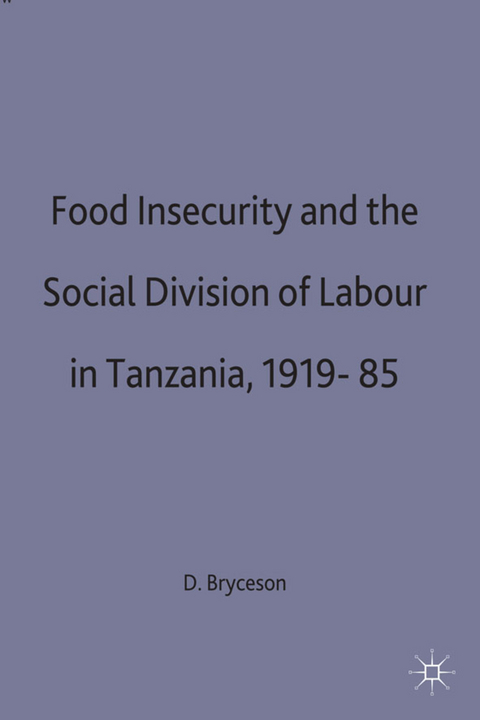
Food Insecurity and the Social Division of Labour in Tanzania,1919-85
Palgrave Macmillan (Verlag)
978-0-333-51938-7 (ISBN)
Most studies of famine and the African food crisis stress how the socio-economic context influences the occurrence of food shortages. By contrast, this book argues that food insecurity itself influences the social and economic organization of the society. Through this approach, the author provides a new interpretation of the causes and consequences of Tanzania's present economic crisis. The book examines the effects of changing food availability on the functioning of the state, the market and clientage networks, over the past seven decades. The conclusion is that clientage is no less important than the state and market as an organizational force in Tanzanian society, and, under heightened food insecurity, the state and market lose ground to clientage.
DEBORAH FAHY BRYCESON
List of Tables - List of Figures and Map - Acknowledgements - Abbreviations and Acronyms - SECTION 1: FOOD SUPPLY IN PRE-INDUSTRIAL SOCIETIES - The Population/Food Production Capability Balance at the Outset of Industrialisation - The Relationship between Population, the Social Division of Labour and Food Supply - Section 1 Summary - SECTION 2: PEASANT HOUSEHOLD, ENVIRONMENT AND FOOD INSECURITY 1919-85 - Physical Determinants of Food Insecurity and Settlement - Characteristics of the Peasant Household Farming Unit - Incidence of Household Food Inadequacy - Section 2 Summary - SECTION 3: EXTRA-HOUSEHOLD SOCIAL INSTITUTIONS AND FOOD INSECURITY: STATE, MARKET AND CLIENTAGE NETWORKS, 1919-50 - Defining Extra-Household Social Institutions - The British Colonial State - The Asian Market - Native Authority Clientage - Section 3 Summary - SECTION 4: WAGE LABOUR FORCE FOOD DEMAND AND SUPPLY, 1919-50 - Food Supply for an African Wage Labour Force - Systematization of Territorial Food Supply, 1939-50 - Section 4 Summary - SECTION 5: STRUCTURAL SOCIAL CHANGE AND URBAN FOOD SUPPLY, 1950-73 - Re-Ordering of the State and Market - Cooperatives and Neighbourhood Clientage Exchange - Urban Growth and Food Adequacy - Section 5 Summary - SECTION 6: URBAN FOOD INSECURITY AND THE UNDERMINING OF OCCUPATIONAL ACCOUNTABILITY, 1973-85 - Merger of the State and Clientage - Parastatal Staple Food Management - Clientage and Crisis, 1979-85 - Section 6 Summary - SECTION 7: FOOD INSECURITY AND THE SOCIAL DIVISION OF LABOUR: SUMMARY AND CONCLUSIONS - Index
| Erscheint lt. Verlag | 9.7.1990 |
|---|---|
| Reihe/Serie | St Antony's Series |
| Zusatzinfo | XVII, 285 p. |
| Verlagsort | Basingstoke |
| Sprache | englisch |
| Maße | 140 x 216 mm |
| Themenwelt | Geschichte ► Allgemeine Geschichte ► 1918 bis 1945 |
| Geschichte ► Allgemeine Geschichte ► Zeitgeschichte | |
| Geisteswissenschaften ► Geschichte ► Regional- / Ländergeschichte | |
| Geschichte ► Teilgebiete der Geschichte ► Kulturgeschichte | |
| Geschichte ► Teilgebiete der Geschichte ► Sozialgeschichte | |
| Geschichte ► Teilgebiete der Geschichte ► Wirtschaftsgeschichte | |
| Sozialwissenschaften ► Ethnologie | |
| Sozialwissenschaften ► Soziologie | |
| ISBN-10 | 0-333-51938-8 / 0333519388 |
| ISBN-13 | 978-0-333-51938-7 / 9780333519387 |
| Zustand | Neuware |
| Haben Sie eine Frage zum Produkt? |
aus dem Bereich


